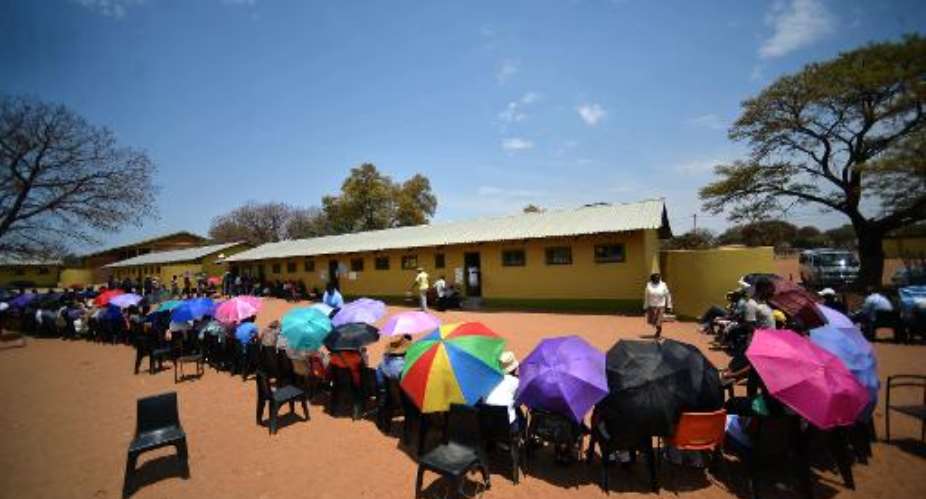Gaborone (Botswana) (AFP) - Early results from Botswana's general elections showed the ruling party in the lead but opposition parties making inroads in the diamond-rich southern African state, according to preliminary figures released by the electoral commission.
With just 11 of the 57 parliamentary seats declared, the ruling Botswana Democratic Party (BDP) had won seven while newcomers, the Umbrella for Democratic Change (UDC), took four.
The BDP, headed by President Ian Khama, held 45 seats in the outgoing parliament.
Parliament elects the president, and it is expected that Khama will win a second term, but with a reduced majority.
In the vote for local council seats, the BDP had won less than half the 13 wards announced in the capital Gaborone, with seven split between the UDC and the Botswana Congress Party (BCP).
That appeared to signal a sharp reversal ahead for the BDP, which in the last election in 2009 won 22 of Gaborone's 30 wards.
Tallying of votes from the 57 parliamentary constituencies got off to a slow start due to delays in the delivery of ballots to counting stations, with 46 constituencies still to be declared.
The electoral body remained confident that final results would be announced "during the course of the night, despite the slow progress", said spokesman Osupile Maroba.
The landlocked, diamond-rich southern African country of two million people is seen as one of the continent's strongest democracies, and Friday's vote saw a high turnout of the 800,000 registered voters.
Khama, 61, is the son of the country's first president, Seretse Khama. He is also a traditional chief of the Bangwato clan and counts on strong rural support.
But he faced a challenge in urban areas, where opposition parties have made inroads since the formation in 2010 of a breakaway party, the Botswana Movement for Democracy (BMD), which is now part of the UDC coalition.
- Worsening economic climate -
Many young voters said they wanted change because unemployment was high and living standards low.
Tau Mongwase, an unemployed youth, complained that "change is slow, very slow".
"I think the government is taking care of us but it's not enough. We need jobs. The mines are not hiring us anymore. Things are very tough for young people here."
Despite Botswana's relatively solid economic performance during the global financial crisis, Khama was aware of the discontent and ran on a platform of change.
"I am pained that we have not been able to do more for our citizens who cannot find work, especially our talented youth... we must do more," Khama said in a letter to the nation last week.
With the global financial crisis leading to a drop in diamond revenues, Khama's government halted planned investment, leading to growing unemployment and slow progress in diversifying the economy.
The opposition Botswana Congress Party, which is led by Dumelang Saleshando, is the fastest growing party in the country, according to an Afrobarometer report issued last week.
The Umbrella for Democratic Change coalition is headed by Duma Boko, who has accused Khama of being increasingly authoritarian.
"These polls are important, we are tired of having just one party take it all," said Paul Metsing, a UDC supporter.
"The UDC has so far done well so far, given its lack of experience in contesting the elections," he said.
Observer missions from the regional Southern African Development Community (SADC), the Commonwealth and the European Union were expected to report officially on the vote later.
South Africa's High Commissioner to Gaborone, Mdu Lembede, one of the observers, told a local news agency that the polls were "peaceful".





 Meta releases new version of conversational AI across its platforms
Meta releases new version of conversational AI across its platforms
 Cape Town named Africa’s Best Airport 2024 by Skytrax
Cape Town named Africa’s Best Airport 2024 by Skytrax
 Bono East: Four injured after hearse transporting corpse crashes into a truck
Bono East: Four injured after hearse transporting corpse crashes into a truck
 ‘Be courageous, find your voice to defend our democracy’ — Sam Jonah urges journ...
‘Be courageous, find your voice to defend our democracy’ — Sam Jonah urges journ...
 Exodus of doctors, nurses and teachers have worsened because of unserious Akufo-...
Exodus of doctors, nurses and teachers have worsened because of unserious Akufo-...
 2024 election: Avoid insults, cutting down people in search of power – National ...
2024 election: Avoid insults, cutting down people in search of power – National ...
 ‘You passed through the back door but congratulations’ — Atubiga on Prof Jane Na...
‘You passed through the back door but congratulations’ — Atubiga on Prof Jane Na...
 Government’s $21.1 billion added to the stock of public debt has been spent judi...
Government’s $21.1 billion added to the stock of public debt has been spent judi...
 Akufo-Addo will soon relocate Mahama’s Ridge Hospital to Kumasi for recommission...
Akufo-Addo will soon relocate Mahama’s Ridge Hospital to Kumasi for recommission...
 We must not compromise on our defence of national interest; this is the time to ...
We must not compromise on our defence of national interest; this is the time to ...
